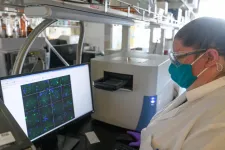(Press-News.org) According to the Centers for Disease Control and Prevention (CDC), children generally appear to be less severely impacted by COVID-19 than adults. But a new study from Children's Hospital Los Angeles shows that the pandemic could be affecting children's health in unexpected ways. The study reveals a surge of patients presenting with diabetic ketoacidosis, a severe complication of type 2 diabetes. Published today in Diabetes Care, these data offer additional insights into how the pandemic may be impacting the nation's children.
Diabetic ketoacidosis, or DKA, is life-threatening. "DKA happens when insulin levels in the blood drop too low for too long," says Lily Chao, MD, MS, Interim Medical Diabetes Director at CHLA. "Insulin helps the body utilize glucose. So when there's not enough insulin, the body starts breaking down fat as a source of energy."
This process, she says, causes dangerously high levels of acids in the blood. If untreated, this can lead to cerebral edema, coma, or even death. "Kids are coming in with dehydration and DKA. But DKA is preventable and reversible if we treat it early and appropriately," says Dr. Chao, who is lead author on the paper.
Dr. Chao and her colleagues noticed back in March of 2020 that more and more patients were coming in with DKA and type 2 diabetes. "We used to see a few DKA cases in type 2 diabetes a year," she says, "and all of a sudden we were seeing a spike, so we began keeping track. Now we have the numbers to confirm that there are more children with type 2 diabetes who present with this very serious complication of DKA."
Yet the question remains: What is the cause of the increased incidence of Type 2 diabetes with DKA?
A year into the COVID-19 pandemic, many children are used to wearing masks and attending online classes. But other changes have affected them, too. Fewer children may be making it to the doctor's office for their routine well-child exams, possibly due to the fear families may feel about exposure to SARS-CoV-2, the virus that causes COVID-19.
"Parents are worried about going outside of the house," says Dr. Chao. "Some families have to take public transportation to go the pediatrician and they are hesitant to do so during the pandemic."
This, she says, may be one of the reasons for the shift she and her colleagues have seen.
In addition to missing doctor visits, other factors may be involved, such as less physical activity during lockdown or reduced access to fresh, healthy foods. But there may also be a biological relationship between exposure to the virus and diabetes.
"There is definitely a link between COVID-19 and diabetes," says Senta Georgia, PhD, an investigator in The Saban Research Institute of Children's Hospital Los Angeles and senior author on the paper. Dr. Georgia runs a basic and translational research program aimed at understanding the cellular biology of diabetes and developing novel therapeutics. "We don't know whether SARS-CoV-2 infects insulin-secreting cells in the pancreas," she says. "There are some reports of a link between COVID-19 and diabetes in adults, but no pediatric studies have been published to date."
As a physician scientist and a laboratory scientist, respectively, Dr. Chao and Dr. Georgia come with unique perspectives--but their objectives converge on getting answers to help children diagnosed with diabetes.
"Our work together at Children's Hospital Los Angeles allows us to address pediatric health on multiple levels," says Dr. Georgia. "I help Dr. Chao design her clinical studies and she works with me on our basic and translational research. So we're coming at the problem of increased incidence of diabetes with both a clinical and a scientific perspective."
Future translational and clinical studies may determine whether increased DKA in patients could be caused by infection with SARS-CoV-2. But for now, the data clearly point to an emerging trend toward more severe diabetes complications during the global pandemic.
The team hopes that these findings will increase vigilance. "It's critical for pediatricians to recognize that when a child presents with symptoms of diabetes, the child needs to be evaluated right away," says Dr. Chao. "The sooner we see these kids, the better chance we have to prevent DKA."
INFORMATION:
Alaina P. Vidmar, MD, was a co-author on the paper. The study was funded by NIH/NCRR SC-CTSI Grant number UL1 TR000130; American Diabetes Association 7-20-COVID-173; The Homer and Gloria Harvey Foundation.
About Children's Hospital Los Angeles
Founded in 1901, Children's Hospital Los Angeles is the highest-ranked children's hospital in California and fifth in the nation on the prestigious U.S. News & World Report Honor Roll of Best Children's Hospitals. U.S. News ranks Children's Hospital Los Angeles in all 10 specialty categories. Clinical care at the hospital is led by physicians who are faculty members of the Keck School of Medicine of USC through an affiliation dating from 1932. The hospital also operates the largest pediatric residency training program at a freestanding children's hospital in the Western United States. The Saban Research Institute of Children's Hospital Los Angeles is home to all basic, translational, clinical and community research conducted at the hospital, allowing proven discoveries to quickly reach patients. Our mission: to create hope and build healthier futures. To learn more, follow us on Facebook, Instagram, LinkedIn, YouTube and Twitter, and visit our blog at CHLA.org/blog.
Like beauty, fairness is in the eye of the beholder.
In the workplace, whether or not we believe that a supervisor has treated us fairly depends on a number of factors, including motive, according to new research from the University of Notre Dame.
Employees evaluate the fairness of an interaction with an authority figure based on what researcher Cindy Muir (Zapata), associate professor of management at Notre Dame's Mendoza College of Business, describes as justice criteria or rules. These include relying on decision-making processes that grant employees voice and are consistent among employees, ethical and free of bias; treating team members with dignity, respect and ...
JACKSONVILLE, Fla. -- A small study from Mayo Clinic researchers raises the concern that some transplant patients may have a limited immune response after being vaccinated for COVID-19 with an mRNA vaccine. Their findings are published as a letter to the editor in the American Journal of Transplantation.
The letter covers seven organ transplant recipients diagnosed with COVID-19 at Mayo Clinic in Florida six to 44 days after receiving either of the mRNA COVID-19 vaccines that have been authorized for emergency use by the Food and Drug Administration. Two patients had received one dose, and five patients had received both doses.
COVID-19 infection was confirmed in all patients with a polymerase chain reaction nasal swab test. The study team, led by Hani Wadei, M.D., ...
Millions of tons of plastic end up in landfills every year. It's a big societal problem and an even larger environmental threat.
In the United States, less than 9% of plastic waste is recycled. Instead, more than 75% of plastics waste ends up in landfills and up to 16% is burned, a process that releases toxic gases into the atmosphere.
Researchers from the University of Delaware's Center for Plastics Innovation (CPI) have developed a direct method to convert single-use plastic waste -- plastic bags, yogurt containers, plastic bottles and bottle caps, packaging and more -- to ready-to-use molecules for jet fuels, diesel and lubricants.
The work, reported in a paper in Science ...
April 23, 2021, Mountain View, CA -- An international team of researchers searched for pieces of a small asteroid tracked in space and then observed to impact Botswana on June 2, 2018. Guided by SETI Institute meteor astronomer Peter Jenniskens, they found 23 meteorites deep inside the Central Kalahari Game Reserve and now have published their findings online in the journal Meteoritics and Planetary Science.
"Combining the observations of the small asteroid in space with information gleaned from the meteorites shows it likely came from Vesta, second largest asteroid in our Solar System and target of NASA's ...
A new study from Vanderbilt University Medical Center researchers finds that new mothers who receive opioids after uncomplicated vaginal births face an increased risk of serious opioid-related events regardless of the opioid dosage, a finding that could significantly impact care delivery.
Andrew Wiese, PhD, MPH, assistant professor of Health Policy in the Division of Pharmacoepidemiology, authored the paper published online April 15 in Women's Health Issues, with Sarah Osmundson, MD, MPH, associate professor of Obstetrics and Gynecology, and other researchers in the departments of Biostatistics and Health Policy.
The study examined roughly 147,000 women enrolled in TennCare -- Tennessee's Medicaid program -- between ...
COLUMBUS, Ohio - A new study of advanced small-cell lung cancer (SCLC) led by researchers at The Ohio State University Comprehensive Cancer Center - Arthur G. James Cancer Hospital and Richard J. Solove Research Institute (OSUCCC - James) has identified molecular patterns linked to patients developing resistance to certain therapies.
This study, published in the journal JTO Clinical and Research Reports, examined more than 60 tumors from five patients. OSUCCC - James researchers identified distinct mutational and molecular changes in four SCLC subtypes. The findings provide new insights into the patterns treatment resistance and could offer new targets for the development of more effective ...
LEXINGTON, Ky. (April 20, 2021) - A new study from University of Kentucky Markey Cancer researchers shows that Artemisia annua, a plant that has been traditionally used for its anti-malaria components, shows promise in treating ovarian cancer.
The study, recently published in Diagnostics, demonstrates that artesunate, a drug synthesized from Artemisia annua, kills ovarian cancer cells in multiple preclinical model systems.
Despite accounting for only 1.3% of all new cancer cases, 2.3% of cancer deaths in 2021 are predicted to be caused by ovarian cancer. The current ...
Wild blueberry fields in Down East Maine are warming faster than the state as a whole, according to a new University of Maine study on the effects of climate change on the barrens over the past 40 years.
The difference in rising temperature rates suggests the need to develop specific wild blueberry management strategies, such as irrigation and fertilizer use, to mitigate the effects of climate change on Down East fields, rather than using tactics devised from statewide climate patterns, according to researchers.
Rafa Tasnim, a Ph.D. student of ecology and environmental sciences, led the study that explored changes in climate change patterns, particularly in temperature and precipitation, ...
The aquatic animal known as the sponge is often described as entirely sessile: once they've settled in a spot and matured, they aren't generally thought of as moving around. But, according to a new study in the journal Current Biology on April 26--in which researchers describe mysterious trails of light brown sponge spicules (spike-like support elements in sponges) across the Arctic seafloor--that isn't always so.
"We observed trails of densely interwoven spicules connected directly to the underside or lower flanks of sponge individuals, suggesting these trails are traces of motility of the sponges," the researchers, led ...
DURHAM, N.C. - A digital app successfully detected one of the telltale characteristics of autism in young children, suggesting the technology could one day become an inexpensive and scalable early screening tool, researchers at Duke University report.
The research team created the app to assess the eye gaze patterns of children while they watched short, strategically designed movies on an iPhone or iPad, then applied computer vision and machine learning to determine whether the child was looking more often at the human in the video, or objects.
"We know that babies who have autism pay attention ...


